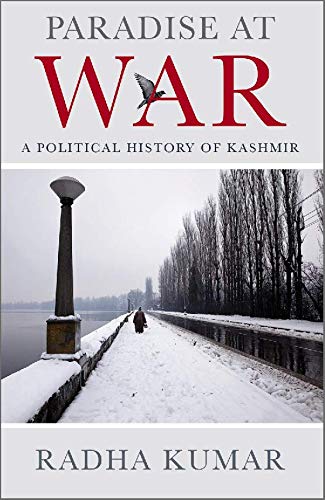Radha Kumar’s Paradise At War is yet another addition to the large corpus of scholarship on politics As is par for the course with much of this literature, starting from a discussion on Kashmiri self-understanding of being unique and exceptional, stemming out of the region’s geographical peripherality and its relatively unbroken tradition, history, and mythology, the book moves to the post-1947 events that led to the rise of insurgency in Kashmir in the late 1980s. The speed at which pre-insurgency political history is traced is rather breakneck, yet it manages to encapsulate quite a lot: pre-Partition politics of the State of Jammu and Kashmir (J&K), the circumstances around the controversial accession to India by Maharaja Hari Singh, the Indo-Pak conflict over J&K, the influence of Cold War politics and the role of the big powers like the US, UK, Russia and China, the inter-regional politics of the State, and the politics of the region administered by Pakistan. Indeed, Kumar is one the very few Indian scholars to engage non-polemically with the last—the politics of Gilgit-Baltistan and region that constitutes what Pakistan calls Azad Kashmir. Untangling the various threads that have created and fostered the conflict in Kashmir is a challenge. Kumar has commendably been able to throw light on many of them.
Expectedly so, however, the most informative and interesting part of the book is where Kumar uses her own experience as a policy-wonk and practitioner to focus attention on the contemporary history of the State starting from 2001. Her initial engagement with Kashmir was with the Indian policy circles working on Kashmir-related peace processes underway since 2002. Over time, it led to a deeper involvement resulting in her eventual appointment to the Government of India’s Group of Interlocutors for Jammu and Kashmir following the resurgence of insurgency in Kashmir Valley in 2010. The inexperience and incompetence of the State Government had led to mishandling of the situation resulting in nearly 117 deaths within a span of three months in street level protests. As a response, GOI felt the need to set up this three-member group.
In the interest of full disclosure, I have known Kumar for nearly two decades now, having worked with her on a project on peace processes, and interacted extensively with all the members of the group of interlocutors—Dileep Padgaonkar, MM Ansari and Kumar—in their various visits to the State. What also needs to be said is that people working on Kashmir in various capacities—as scholars, as policy-makers, and peace practitioners—make for a very incestuous circle, who despite their differences and place in diverse spaces have over a period of time learnt to listen to each other and attempted to further the cause of peace in the State, if not a solution to its political problem.

